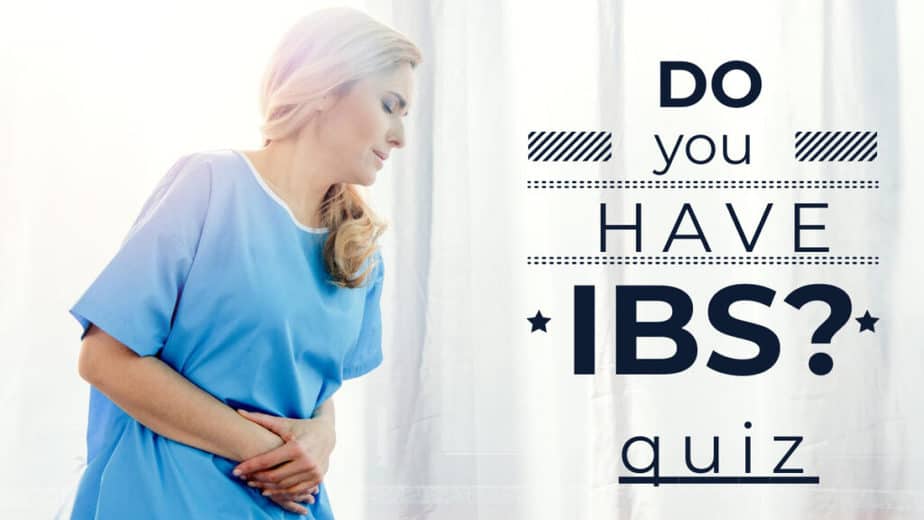Irritable bowel syndrome vs Diverticulitis – These are two different conditions that can cause issues with the digestive system.
People often get confused between them as their symptoms can be fairly similar, but they are in fact very different conditions.
So what are the differences between irritable bowel syndrome (IBS) and diverticulitis? How do you know which one you have?
We have put together some useful information about the two conditions to help you understand the differences between them.
What is Irritable Bowel Syndrome
Irritable bowel syndrome is a chronic condition associated with abdominal pain and a change in bowel habits – either constipation or diarrhea. It is a chronic condition. In some cases, it can cause significant pain and discomfort.
The cause of this condition is unknown, but is thought to result from an impairment in the signaling between your gut and brain. There are certain triggers which cause the symptoms to flare up. Adjusting your diet and managing stress can help improve IBS symptoms.
- Related article: What Triggers IBS?
What is Diverticulitis
Diverticulitis is a health condition in which small pockets called diverticula that form in the wall of the digestive tract become inflamed and infected.
Diverticula develop when the inner layer of the digestive tract protrudes through weak spots of the outer layer of the digestive tract to form an outpouching.
Once the diverticula form, they will always be there. This is known as DIVERTICULOSIS.
The diverticula can become inflamed, resulting in DIVERTICULITIS. The exact cause of this condition is unknown but it is closely linked to a low fiber diet.
Symptoms
Irritable bowel syndrome and diverticulitis often get mistaken for each other as some of the symptoms are very similar.
Both conditions cause uncomfortable bloating, abdominal pain, constipation or diarrhea, and nausea.
Diverticulitis also causes fever, chills, vomiting, and occasional blood in the stool. It has a fairly abrupt onset. Every once in a while, a patient will display little to no symptoms.
Irritable bowel syndrome causes chronic intermittent abdominal pain, constipation, diarrhea, or both, flatulence, and sometimes mucus in the stool. Fevers and chills, vomiting, blood in the stool and bowel incontinence are not typical symptoms of IBS, and further diagnostic testing is warranted in these cases.
Diagnosis
It can be difficult to diagnose irritable bowel syndrome, so a lot of people are self-diagnosed, based on their Google searches. There is no specific test for the condition – it is a clinical diagnosis based on history and physical exam findings. In many cases, no further testing is needed.
Keeping your symptom diary as mentioned above for a few months before your doctor’s appointment might make the process easier, as the doctor will ask you to describe your symptoms and what you think causes them.
There may be a physical examination of your abdomen to feel for swelling or any lumps or areas that are tender to touch. You may need blood tests to test for other conditions such as Celiac disease, especially in cases where diarrhea is a predominant symptom.
The doctor may also ask you to provide a stool sample so they can check for inflammatory markers and exclude bacterial and parasitic infections.
Once these tests are complete, if there are no other concerns, you may be diagnosed with irritable bowel syndrome.
If there are “alarm symptoms” like unintentional weight loss, rectal bleeding, waking from sleep to have bowel movements, or a family history of inflammatory bowel disease (Crohn’s or ulcerative colitis) or colon cancer, they may recommend a colonoscopy. If you are over age 45, your doctor will most likely also recommend a colonoscopy to screen for colon cancer.
The colonoscopy involves insertion of a tube with a small camera at the end into your rectum and guided gently to the opposite end of the colon. In the United States, most patients are sedated with anesthesia for the procedure, but it can be done in an unsedated person.
To prepare for a colonoscopy, you will be given a laxative to flush out your bowels before the procedure. Learn more about Different Types of Laxatives.
The diagnosis of diverticulosis (just having the pockets) is often established during a routine screening colonoscopy or a CT scan of your abdomen and pelvis.
If you are having symptoms suggestive of acute diverticulitis (like acute onset of localized abdominal pain associated with fever and chills), your doctor may recommend a CT scan (an imaging study, often times with IV contrast).
The radiologist can visualize the outpouchings in the colon wall and can look for one that may be inflamed or infected. In some cases of diverticulitis there can be a “contained perforation.” In most cases, these are small and resolve with standard antibiotic therapy, but if they fail to improve or are large in size, they can sometimes require drainage or surgery.
Treatment
There is no cure for irritable bowel syndrome, but there are ways to manage the symptoms and prevent flare ups. Stick to a diet high in fiber and try to avoid caffeine and alcohol and foods like dairy, gluten or high FODMAP foods that may trigger symptoms.
Don’t exceed more than 3 portions of fruit a day as this can worsen bloating and flatulence.
Take steps to reduce your stress and anxiety as these can trigger your symptoms or make them worse. It is also recommended to exercise regularly (to reduce stress and encourage regular bowel movements).
What makes irritable bowel syndrome different from other conditions is that it affects people differently.
The foods that trigger your flare-ups may be different from someone else’s trigger foods. To get to know your body better, keep a diary of what you eat, your activity levels and your mood swings, alongside your symptoms.
Overtime, you can use this information to build a personalized list of things to try and avoid.
It is not known what triggers an episode of acute diverticulitis. A diet high in fiber may help to reduce frequency of episodes. If you are struggling to get enough fiber in your diet then you can use fiber supplements. It is important to increase your fiber intake gradually to avoid unpleasant side effects such as bloating, cramps and flatulence.
During an acute episode of diverticulitis, your doctor may recommend a low fiber diet. When the bowel is inflamed, it may become narrowed and make it more difficult for high fiber foods to pass the area of inflammation which could exacerbate pain. You may still be feeling constipated after bowel movements.
Antibiotics (oral in mild cases and intravenous in more severe cases) are the mainstay of treatment for diverticulitis, although there is some evidence suggesting that in mild cases, antibiotics may not be necessary.
In some cases when the disease is more advanced, percutaneous drainage (a procedure in which a radiologist inserts a small drainage catheter into your abdomen) or surgery may be required.
This typically is only needed in the case of a large abscess (pocket of infection around the diverticulum), if there is a fistula (communication from the inflamed diverticulum to another organ like the bladder or vagina) or for recurrent episodes of diverticulitis.
After an episode of diverticulitis, a colonoscopy is recommended due to the possibility of a colon cancer mimicking diverticulitis on a CT scan.
- Related article: What is a Suppository?
Who is Affected?
Another difference between these conditions is who it impacts the most.
Irritable bowel syndrome is more common among women than men. It can affect people of all ages but is often diagnosed in people ages 25 and over.
Diverticulosis and diverticulitis become more common with age. In people 50 or older, diverticulitis affects more men than women.
However, there is a very good chance that most people aged 80 or older will have diverticula in the digestive tract even if they are not causing any symptoms.
Conclusion
While there is a crossover in symptoms between two health conditions, IBS vs Diverticulitis, they are in fact very different and the processes that happen within the body to cause the symptoms are different.
Irritable bowel syndrome treatment involves diet and lifestyle modifications, with medications used to help manage or adjust the bowel habits and reduce abdominal pain and cramps.
Diverticulitis is more straightforward to manage, as it usually just requires a short course of antibiotics, unless the symptoms become severe enough to require hospitalization or surgical intervention.
The process of diagnosing irritable bowel syndrome is much less invasive, though it may take some time to get an official diagnosis, if other causes for your symptoms need to be excluded.
For more IBS and Diverticulitis related articles, check these out:


